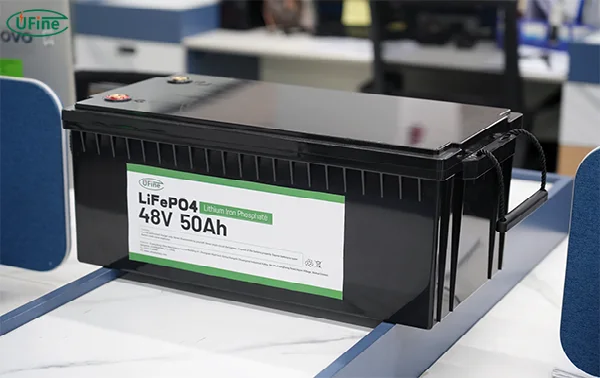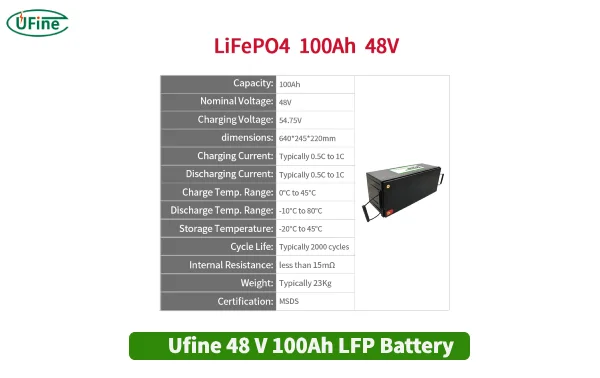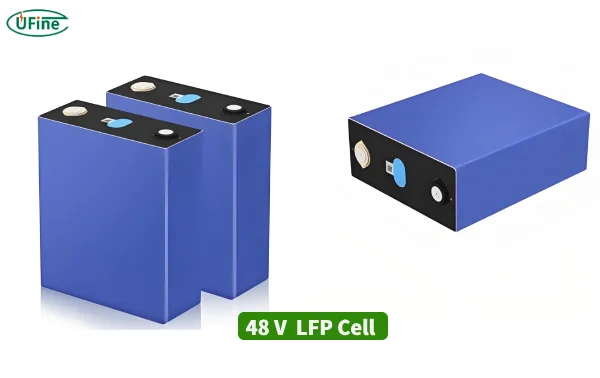
- Part 1. What is a 48v LFP battery?
- Part 2. 48v LFP battery parameters
- Part 3. Advantages and disadvantages
- Part 4. 48v LFP battery applications
- Part 5. How many LiFePO4 cells are in a 48v LFP battery?
- Part 6. How long does a 48v LFP battery last?
- Part 7. Maintenance and charging
- Part 8. Custom 48v LFP battery
48v LFP batteries are becoming increasingly popular in various fields. Known for their reliability, safety, and efficiency, these batteries are a preferred choice for many applications. In this comprehensive guide, we will delve into the details of 48v LFP batteries. We’ll cover their features, advantages, applications, and maintenance tips. Whether you’re considering these batteries for your electric vehicle, solar energy system, or another use, this article will provide you with all the information you need.
Part 1. What is a 48v LFP battery?
A 48v LFP battery, or Lithium Iron Phosphate battery, is a type of rechargeable battery that uses lithium iron phosphate as the cathode material. Belonging to the LiFePO4 battery family, these batteries are renowned for their stable chemistry, long lifespan, and enhanced safety. Unlike other lithium-ion batteries, LFP batteries offer a unique combination of durability and efficiency, making them ideal for high-demand applications.
How LFP Batteries Work
LFP batteries operate by transferring lithium ions between the anode and cathode during charging and discharging cycles. The lithium iron phosphate in the cathode provides a stable structure, reducing the risk of overheating and increasing the battery’s overall safety. This stability is one of the key reasons why 48v LFP batteries are favored in various industries.
Part 2. 48v LFP battery parameters
Voltage
The nominal voltage of a 48v LFP battery is, as the name suggests, 48 volts. This voltage level is suitable for a wide range of applications, from powering electric vehicles to serving as a reliable energy storage solution in solar power systems. The 48-volt configuration strikes a balance between power and safety, offering sufficient energy without the risks associated with higher voltage systems.
Dimensions
The dimensions of a 48v LFP battery can vary depending on the manufacturer and the specific application. Generally, these batteries are designed to be compact and lightweight, making them easy to integrate into various devices and systems. For instance, in electric vehicles, the battery’s size is optimized to fit within the vehicle’s design constraints while still providing ample power.
Capacity
The capacity of a 48v LFP battery is a crucial parameter that determines how much energy the battery can store. Capacities can range from as low as 10Ah to over 100Ah, depending on the specific model and application. Higher capacity batteries are typically used in applications that require extended operation times, such as solar energy storage and backup power systems.
Weight
Weight is another important factor to consider, especially in applications like electric vehicles where every kilogram matters. 48v LFP batteries are relatively lightweight compared to other types of batteries with similar capacities. This makes them an attractive option for portable devices and vehicles, where reducing weight can significantly improve performance and efficiency.
Part 3. Advantages and disadvantages
Advantages
Safety
One of the primary advantages of 48v LFP batteries is their safety. Unlike other lithium-ion batteries, LFP batteries are less prone to overheating and thermal runaway. This makes them a safer choice for applications where battery safety is paramount, such as in electric vehicles and residential energy storage systems.
Long Lifespan
48v LFP batteries are known for their long lifespan. They can endure thousands of charge and discharge cycles without significant degradation in performance. This longevity translates to a lower total cost of ownership, as the batteries need to be replaced less frequently compared to other types of batteries.
Efficiency
Efficiency is another key benefit of 48v LFP batteries. They have a high discharge rate, which means they can deliver energy quickly when needed. This makes them ideal for high-demand applications such as electric vehicles and backup power systems. Additionally, LFP batteries have a low self-discharge rate, meaning they retain their charge for longer periods when not in use.
Environmentally Friendly
48v LFP batteries are more environmentally friendly compared to other types of batteries. They do not contain harmful heavy metals like lead or cadmium, and their components are more easily recyclable. This makes them a more sustainable choice for energy storage solutions.
Disadvantages
Energy Density
One of the main disadvantages of 48v LFP batteries is their lower energy density compared to other lithium-ion batteries. This means they store less energy for a given size and weight. While this may not be a significant issue for stationary applications, it can be a limitation in portable devices and electric vehicles where space and weight are critical factors.
Cost
Another potential drawback is the cost. 48v LFP batteries can be more expensive upfront compared to other battery types. However, their long lifespan and lower maintenance requirements can offset this initial investment over time.
Part 4. 48v LFP battery applications
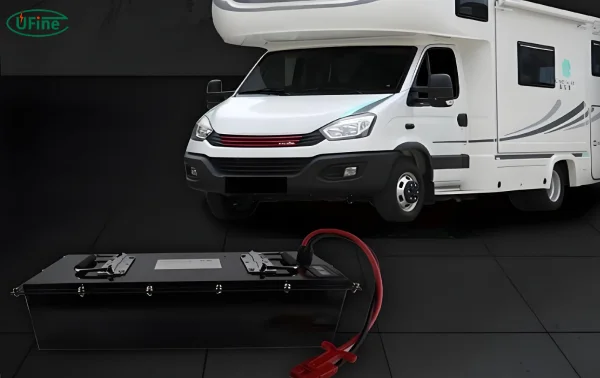
Electric Vehicles
48v LFP batteries are widely used in electric vehicles (EVs). Their high discharge rate and long lifespan make them ideal for providing the power needed to drive electric cars, bikes, and scooters. Additionally, their enhanced safety features reduce the risk of accidents, making EVs safer for consumers.
Solar Energy Storage
In solar energy systems, 48v LFP batteries are used to store energy generated by solar panels for later use. This ensures a reliable power supply even when the sun is not shining. The high efficiency and long lifespan of LFP batteries make them an excellent choice for residential and commercial solar energy storage solutions.
Backup Power Systems
48v LFP batteries are also used in backup power systems for homes and businesses. In the event of a power outage, these batteries can provide a reliable source of power, ensuring that critical systems and devices remain operational. Their ability to deliver energy quickly and efficiently makes them ideal for this application.
Marine Applications
Marine vessels, such as boats and yachts, also benefit from using 48v LFP batteries. These batteries provide a reliable source of power for navigation systems, lighting, and other onboard equipment. Their compact size and lightweight nature make them easy to install in marine environments where space is limited.
Part 5. How many LiFePO4 cells are in a 48v LFP battery?
A single LiFePO4 cell has a nominal voltage of 3.2 volts. To achieve a total voltage of 48 volts, 15 cells are connected in series. This series configuration increases the voltage while maintaining the same capacity. The precise arrangement of these cells can vary depending on the specific design and application of the battery. For instance, in some high-capacity batteries, cells may also be connected in parallel to increase the overall capacity while maintaining the desired voltage.
Part 6. How long does a 48v LFP battery last?
The lifespan of a 48v LFP battery is one of its standout features. These batteries can last between 2,000 to 5,000 charge cycles, depending on how they are used and maintained. In practical terms, this means a lifespan of several years, even with regular use. For example, in an electric vehicle used for daily commuting, a 48v LFP battery could last up to 10 years or more. Proper maintenance, such as avoiding deep discharges and keeping the battery within optimal temperature ranges, can further extend its lifespan.
Part 7. Maintenance and charging
Regular Charging
To get the most out of a 48v LFP battery, it’s important to maintain a regular charging routine. Ideally, keep the battery charged between 20% and 80% of its capacity. Avoid letting the battery discharge completely, as this can reduce its overall lifespan.
Avoid Overcharging
Overcharging a 48v LFP battery can damage its cells and reduce its lifespan. Use a charger specifically designed for LFP batteries to prevent overcharging. These chargers often come with built-in safety features to protect the battery.
Store Properly
If you’re not using the battery for an extended period, store it in a cool, dry place. Avoid exposing the battery to extreme temperatures, as this can affect its performance and longevity. Ideally, store the battery at around 50% charge to maintain its health during long periods of inactivity.
Part 8. Custom 48v LFP battery
For those who need specific battery configurations, custom 48v LFP batteries are available. Ufine, a Chinese lithium battery manufacturer, offers customization options to meet unique requirements. They can tailor the shape, size, capacity, and voltage of their batteries to suit various applications. Whether you need lithium polymer batteries, cylindrical batteries, or LiFePO4 batteries, Ufine can provide a solution that meets your specific needs.
Understanding the features and benefits of 48v LFP batteries can help you make an informed decision for your energy storage needs. With their safety, efficiency, and long lifespan, these batteries are an excellent choice for a wide range of applications. Whether you’re looking for a reliable power source for your electric vehicle, solar energy system, or backup power solution, 48v LFP batteries offer a versatile and sustainable option. For custom solutions, manufacturers like Ufine can provide tailored options to meet your specific requirements.
Related Tags:
More Articles
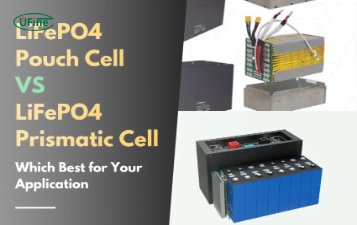
LiFePO4 Pouch Cells vs. Prismatic Cells: Complete Comparison
Compare LiFePO4 pouch cells and prismatic cells. Learn differences, benefits, and ideal uses for EVs, drones, solar storage, and portable electronics.
Lithium Metal Battery vs Lithium-ion Battery: What is the Difference?
Lithium metal and lithium-ion batteries differ in energy density, safety, lifespan, and uses. Learn which battery type is better for medical or electronics use.
How to Choose the Best Wheelchair Battery?
Looking for the best wheelchair battery? Compare battery types, prices, lifespan, and expert tips before buying a wheelchair battery.
Laptop Batteries : What You Need to Know
Learn everything about laptop batteries, including types (Li-ion, Li-Po), materials, lifespan, and maintenance tips to keep your device running longer.
How to Connect Lithium Batteries in Series and Parallel?
We'll explore the basics and provide detailed, step-by-step instructions on how to connect li-ion cells in series, parallel, and series-parallel configurations.
